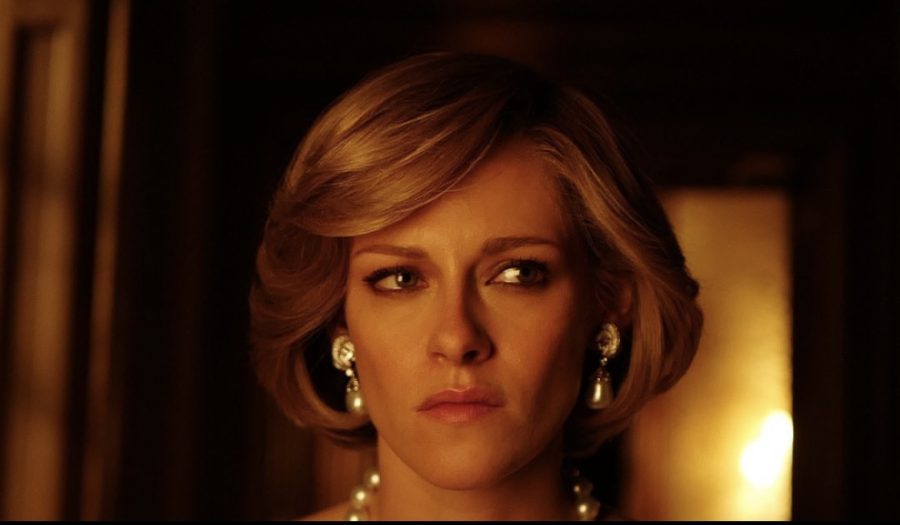*CW: This film contains depictions of bulimia and self-harm.*
“Poor strangers, they have so much to be afraid of.”
-Shirley Jackson, “We Have Always Lived in the Castle”
Sandringham Estate, 1991: Diana Spencer, Princess of Wales, is late for Christmas. Not that she wanted to come; the holidays can be hell but when your in-laws are the Royal Family (and your royal husband is blatantly cheating on you), it’s downright suffocating. As Diana’s familial ties come loose and her world caves in, she realizes her only option left is to do the impossible. God save the Princess.
A self-dubbed “fable from a true tragedy,” “Spencer” is its own beast. Kristen Stewart’s revelatory performance is jarring upon first glance, but she disappears into the role, delivering a performance that even garnered praise from Diana’s former bodyguard. The film wears its “Barry Lyndon” influences on its sleeve (props to cinematographer Claire Mathon!) and much like his 2016 Jackie Kennedy biopic “Jackie,” director Pablo Larraín remains drawn to complex and extremely public women amidst personal turmoil; but if “Jackie” was covering an aftermath, then “Spencer” takes us to the eye of the storm.
Something’s off from the moment Jonny Greenwood’s woozy, jazz-tinged score skitters in. We get the feeling that we’re somewhere we’re not supposed to be, like we’re prying too closely. As the royal guests enter, they perch on a scale as if preparing for a ritual. An unintentionally(?) ominous kitchen sign warns, “Keep Noise To A Minimum, They Can Hear You.” One can’t help but wonder what a Larraín-directed horror film would be like; perhaps this is his horror film?
“Spencer” plays more like “The Innocents” than “The Crown;” the royals have never seemed more like a lifeless, stilted brood from a Gothic horror story. During one particularly tense dinner scene, they look like they’re about to devour Diana whole. Sandringham Estate becomes a rickety old manor complete with its own ghost; this iteration of Diana finds herself (figuratively) haunted by Anne Boleyn, King Henry VIII’s notorious second wife, of whom Diana was her 13th grandniece (via sister Mary Boleyn). It’s an understandable comparison, both women were outspoken and bucked royal tradition, but it’s such an aggressively obvious choice that it feels like it’s straight out of a macabre history class fanfic.
Perhaps the more haunting specter is that of tradition. In the film, the Royal Family makes a show of weighing everyone pre-and post-dinner to see if they gained weight and therefore enjoyed their meal. Yes, this is an allegedly real royal custom. It seems a chillingly apt metaphor for the Family’s flamboyantly distant nature; why stoop to relatability and just ask everyone if they liked the meal when you can make a grand show out of it to justify your equally grand titles?
This ritual seems even more absurd and oppressive when Diana’s struggles with bulimia, which are featured prominently, are taken into account. Her body and image aren’t her own, they are “currency,” as the Queen tells her. As a princess, she has more than a job to fulfill, she has a role she must play. In doing so, she has put herself down as collateral for the sake of “The Firm.” Her pearls are a noose, her gown a silken cell. A bit melodramatic? To some perhaps, but in a post-Meghan-and-Harry-interview world, it’s a bone-chilling condemnation.
“Spencer,” much like its subject, eschews convention to chronicle the intimate horror of a woman trapped by expectations and an ancient institution reluctant to change. While it occasionally verges towards maudlin territory, its audacious approach could make it one of the crown jewels of this awards season. If there’s one thing the Oscars love, it’s behind-the-gilded-curtain biopics…and “Spencer” tears the curtain down, for better or worse.
6/10
For eating disorders, please call the NEDA Hotline: 1-800-931-2237
For suicide prevention, please call the San Diego Access and Crisis Line: (888) 724-7240
(Dedicated to my Grandma, Princess Di superfan and my Queen Mum.)







